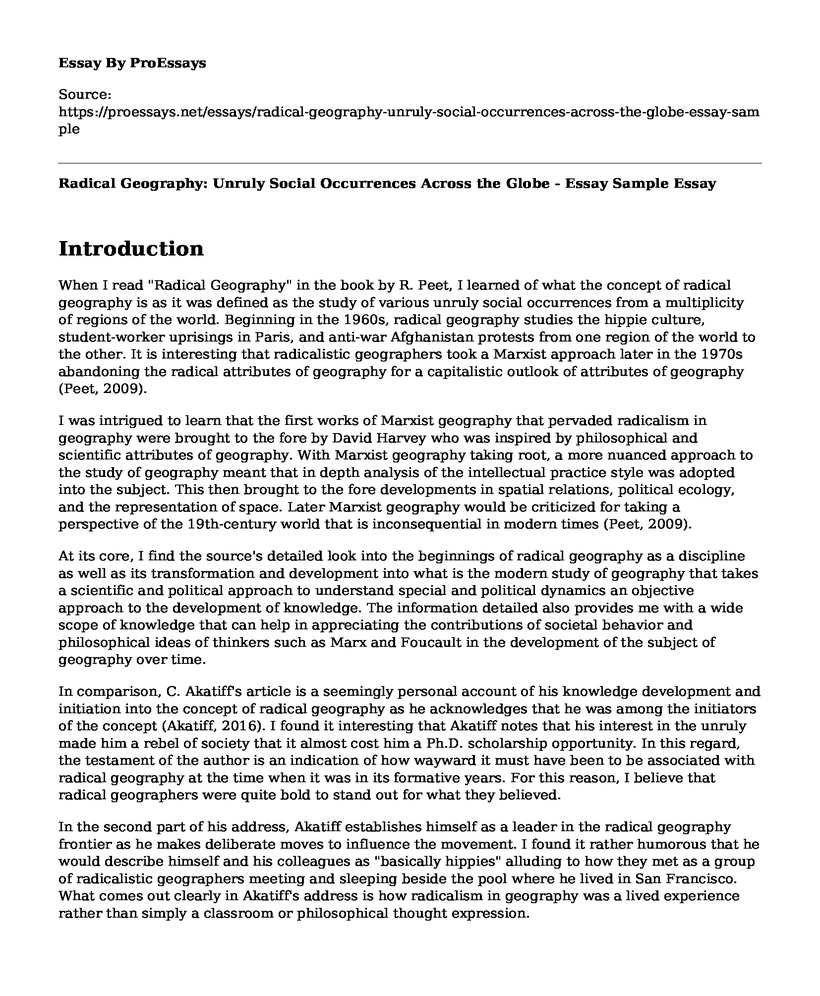Introduction
When I read "Radical Geography" in the book by R. Peet, I learned of what the concept of radical geography is as it was defined as the study of various unruly social occurrences from a multiplicity of regions of the world. Beginning in the 1960s, radical geography studies the hippie culture, student-worker uprisings in Paris, and anti-war Afghanistan protests from one region of the world to the other. It is interesting that radicalistic geographers took a Marxist approach later in the 1970s abandoning the radical attributes of geography for a capitalistic outlook of attributes of geography (Peet, 2009).
I was intrigued to learn that the first works of Marxist geography that pervaded radicalism in geography were brought to the fore by David Harvey who was inspired by philosophical and scientific attributes of geography. With Marxist geography taking root, a more nuanced approach to the study of geography meant that in depth analysis of the intellectual practice style was adopted into the subject. This then brought to the fore developments in spatial relations, political ecology, and the representation of space. Later Marxist geography would be criticized for taking a perspective of the 19th-century world that is inconsequential in modern times (Peet, 2009).
At its core, I find the source's detailed look into the beginnings of radical geography as a discipline as well as its transformation and development into what is the modern study of geography that takes a scientific and political approach to understand special and political dynamics an objective approach to the development of knowledge. The information detailed also provides me with a wide scope of knowledge that can help in appreciating the contributions of societal behavior and philosophical ideas of thinkers such as Marx and Foucault in the development of the subject of geography over time.
In comparison, C. Akatiff's article is a seemingly personal account of his knowledge development and initiation into the concept of radical geography as he acknowledges that he was among the initiators of the concept (Akatiff, 2016). I found it interesting that Akatiff notes that his interest in the unruly made him a rebel of society that it almost cost him a Ph.D. scholarship opportunity. In this regard, the testament of the author is an indication of how wayward it must have been to be associated with radical geography at the time when it was in its formative years. For this reason, I believe that radical geographers were quite bold to stand out for what they believed.
In the second part of his address, Akatiff establishes himself as a leader in the radical geography frontier as he makes deliberate moves to influence the movement. I found it rather humorous that he would describe himself and his colleagues as "basically hippies" alluding to how they met as a group of radicalistic geographers meeting and sleeping beside the pool where he lived in San Francisco. What comes out clearly in Akatiff's address is how radicalism in geography was a lived experience rather than simply a classroom or philosophical thought expression.
Put together, both sources Akatiff (2016) and Peet (2009) epitomize excellence in the dedication that early scholars enthusiastically imparted their time and energy in developing the sub-culture of radical geography. For this reason, I find the sources quite informative and valuable towards understanding the basic roots of radical geography alongside its development to what is known as modern scientific and philosophical geography.
References
Akatiff, C. (2016). Roots of radical geography. Yearbook of the Association of Pacific Coast Geographers, 78, 258-278. doi:10.1353/pcg.2016.0014
Peet, R. (2009). Radical geography. Elsevier Ltd.
Cite this page
Radical Geography: Unruly Social Occurrences Across the Globe - Essay Sample. (2023, May 03). Retrieved from https://proessays.net/essays/radical-geography-unruly-social-occurrences-across-the-globe-essay-sample
If you are the original author of this essay and no longer wish to have it published on the ProEssays website, please click below to request its removal:
- Types of Pendulum Research Paper Example
- Heat Transfer From a Circular Cylinder Paper Example
- Paper Example on General Physics: Vectors and Projectiles, Newton's Law and Motion Etc.
- Understanding Gravitational Waves and the Improved Lasers Paper Example
- Paper Example on Types of Polarizers
- Essay Example on Synthesis of NAC Thioesters: Global De-Protection Route
- Explore the Solar System: Kuiper-Belt & Oort Cloud - Essay Sample







